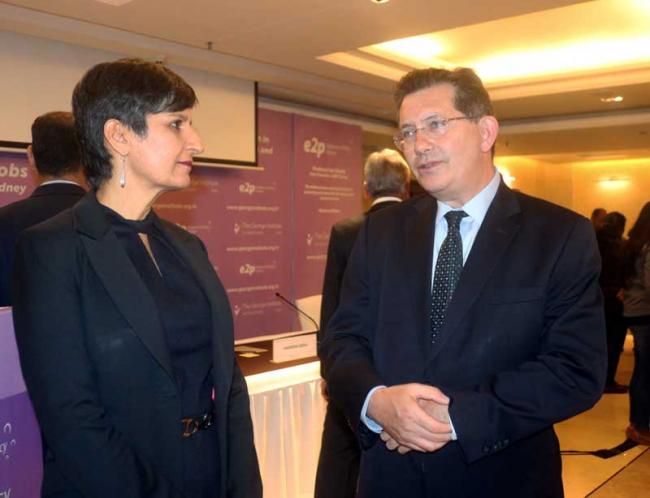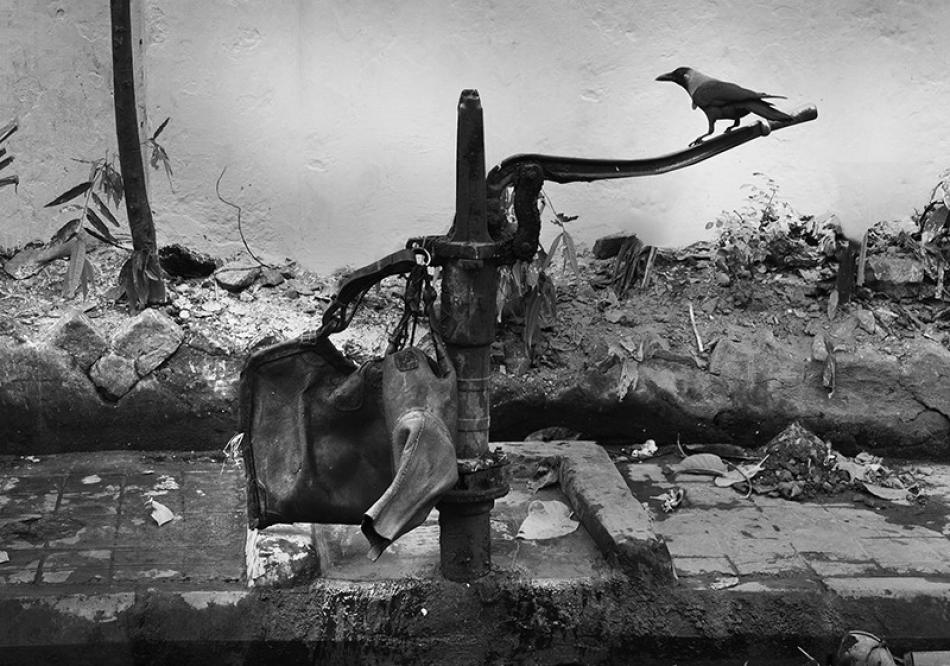NITN | @notintownlive | 11 Dec 2018, 02:34 pm

New Delhi, Dec 10 (NITN): Underscoring the urgent need for countries like India to put women’s cancers on the map of the public health agenda, Prof Ian Jacobs, Vice-Chancellor of the University of New South Wales (UNSW), Sydney, an acknowledged global expert on the subject, Monday said India can benefit immensely from the global experience on screening and prevention in the area of ovarian and cervical cancers.
Delivering The George Institute India’s inaugural evidence2policy lecture at the India Habitat Centre on “The evidence base and case for action in screening and prevention for ovarian and cervical cancers”, Prof, Jacobs said the UNSW was keen to work with The George Institute and other partners in India on this issue.
Australian High Commissioner to India, Harinder Sidhu, who was the chief guest for the occasion, pointed out that cervical cancer was a preventable cancer but there was a lot of misinformation in the area of HPV vaccination. She said the Australian High Commission in India launched a social media campaign to clear much of the misinformation prevalent on the issue, particularly in rural India. Talking about the Australia-India health partnership, she said health has been identified as one of the key areas of co-operation in Australia's new
economic strategy towards India.
With more than 30 years’ experience in the field of ovarian cancer screening research and having established a large community-based cervical cancer screening program in Uganda, Prof Jacob’s lecture focussed on the gap between evidence and global action in cancer screening and what countries like India can learn from this global experience in terms of prioritising screening and prevention.
Setting the context for the lecture and the focus on women’s cancers, Prof Vivekanand Jha, Executive Director of The George Institute for Global Health, India, a public health research institute that is at the forefront of NCD and health systems research, said appropriate response to women’s cancers should to be made an integral part of the health policy if India is to achieve universal health coverage as envisaged under the Sustainable Development Goals.
Prof Jacobs traced the history of the cervical cancer screening program tracing from the first pap smear tests which revealed that cervical cancer develops over a long period of time thus giving a lot of time for early screening programs to detect the cancer. When the HPV was discovered, it made prevention possible through the HPV vaccination. So, both prevention as well as screening are quite possible.
On the occasion, George Institute India honoured Prof Jacobs with a citation that recognised Prof. Jacobs’s immense contribution to the field of women’s health and the impact his research in the field of ovarian and cervical cancers has had on public health.
Referring to a series of studies done in the US and the UK, screening for ovarian cancers among women in the high-risk group was a definitive strategy to prevent it along with removing the ovaries.
.jpg)
countries. The good news, she said, was that these cancers are very much preventable. Australia has been a model in the elimination of cervical cancers, she said.
The panellists included Jagdish Kaur, Regional Advisor, TFI, WHO SEARO; Sanjay Gupta, Scientist, National Institute of Cancer Prevention and Research; Neerja Bhatla, Professor, Department of Obstetrics and Gynaecology, All India Institute of Medical Sciences ; Krithiga Shridhar, Research Scientist, Public Health Foundation of India ; Jyotsna Govil, Vice Chairman, Indian Cancer Society and Roopa Hariprasad, Scientist, National Institute of Cancer Prevention and Research.
Speaking on the occasion, Dr Sanjay Gupta of NICPR spoke about the efforts underway for incorporating the screening of oral, breast and cervical cancer as part of the Comprehensive Primary Health Care rollout. He said there is a need for an integrated cancer care approach that includes education, awareness, screening, detection, treatment, and survivorship. Dr. Roopa Hariprasad from NICPR shared the training and capacity building of health workers in cancer screening.
Pointing out that tobacco was a great risk factor for women’s cancers, Dr Jagdish Kaur spoke about the tobacco-free initiative which she was heading at WHO-SEARO.
Dr Neerja Bhatla from AIIMS spoke about the screening modalities and linkages between screening initatives and treatment options.
Dr Kritiga Shridhar from PHFI shared her research around cancer burden, biology, management and survival in women. Diseases like cancer, she said, behave differently among men and women. Women, she said are affected by cancers in a different way and hence the treatment has to be different.
Dr Jyotsna Govil of the Indian Cancer Society spoke about the various initiatives they had launched for creating awareness on the most common cancers among women.
Globally, cancer incidence is 25% higher in men than in women. However, in India, more women are diagnosed with cancer than men. There are several possible explanations - one is lack of awareness and access to timely treatment which is common to many women’s health issues and therefore need to be addressed as an immediate public health agenda in the broader context of women’s health.
- Religion without servility: Journalist Anshul Chaturvedi on why Vivekananda speaks to believers and atheists alike
- Culturist Sundeep Bhutoria unveils anthology When Gods Don't Matter at Jaipur LitFest 2026
- Kolkata CP urges elderly to stay alert against digital scams at ‘Pronam’ interaction
- Sona Incubations, Salem picks 17 startups for Rs 11 Mn DST investment, grant
- Visva-Bharati University unveils a transformational roadmap under Vice-Chancellor Dr. Probir Kumar Ghosh
- Sona College of Technology hosts Think Salem 2025: To spur startup opportunity from Tier-2 Cities
- ACM India unveils National AI Olympiad 2026 to spot school talent for global AI stage
- Reject Macaulayan education, reclaim Indian values: H M Bangur’s big World Hindu Economic Forum pitch
- Sona College of Technology: Many academic, research and industry-linked advances in 2025
- Kolkata: ICCR hosts 10th anniversary celebration of Robir Kiran
Indian airline major Air India today announced a significant enhancement to its popular Mumbai-Frankfurt route, with the deployment of its newly delivered, first line-fit (or made-for-Air India)
Saudia, the national flag carrier of Saudi Arabia, and Air India, India’s leading global airline, have signed a codeshare agreement that will take effect in February.
Air India and Saudi Arabia’s flag carrier Saudia will begin a new codeshare partnership from February, allowing both airlines to offer expanded route options and smoother connections for passengers travelling between the two countries.





